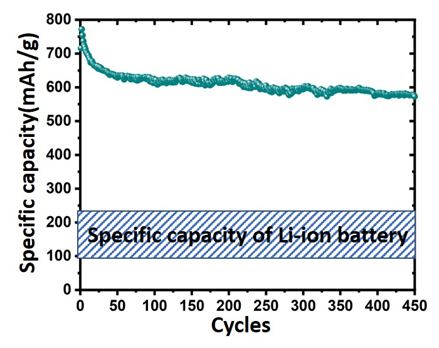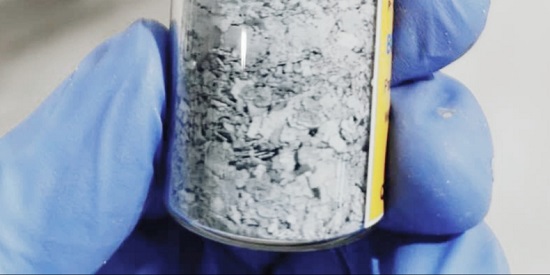Nanotechnology creates next-generation powerful battery technology
Media release
Mobile phones with a one-week battery? Electric cars with a 1000 kilometre range? Drones that fly for hours between charges?
These pipe dreams could soon be a reality after researchers at Deakin University, in partnership with Australian start-up Li-S Energy Ltd, developed an innovative new lithium sulphur battery that represents a step-change in the global battery industry.
Lithium Sulphur (Li-S) batteries are considered next-generation batteries with a significantly higher energy capacity than existing lithium-ion batteries. However, to date, they have a severe limitation with lifetime performance, typically degrading to the point of failure over very few charge and discharge cycles.
Deakin’s Nanotechnology research team has developed an innovative use of the nanomaterial, Boron Nitride Nanotubes (BNNT), to improve the performance of Li-S batteries – retaining the high energy capacity and also avoiding significant degradation over more than 450 charge and discharge cycles (see Figure 1).
There were three key challenges to overcome in creating a high-performance Li-S battery:
- Engineering a conductive interface within the sulphur cathode;
- Controlling the structural integrity of the cathode over extended cycling; and
- Preventing dendrite growth from the lithium metal anode.
Each challenge involved significant aspects of innovation using BNNT and other integrated materials, which together facilitated the optimum functional relationship between lithium and sulphur in an energy storage device.
Li-S Energy has now lodged two key provisional patents covering the function of BNNT within the lithium sulphur battery chemistry. The new technology covered by these patents has the potential to make large scale manufacturing of lithium sulphur batteries commercially viable for the first time.
Li-S Energy intends to optimise the design, then scale up the production of the new batteries over the coming years, with almost unlimited potential uses – including the possibility of an electric car that needs charging only every 1000 kilometres, a phone with a one-week battery life, off-grid solar/battery street-lighting and drones with several hours of flight time.
The research and initial production have been undertaken in Deakin’s advanced manufacturing precinct in Geelong, leveraging the expertise of Deakin’s Institute for Frontier Materials and the facilities of Deakin’s ManuFutures scale-up accelerator. The critical BNNT material is provided by another ManuFutures tenant, BNNT Technology Ltd, and Li-S Energy’s initial production plant is slated for Deakin’s new ManuFutures 2 facility, a $20 million partnership investment project supported by the Victorian Government’s Higher Educational Strategic Infrastructure Fund.
Li-S Energy and BNNT Technology Ltd are both joint ventures between Deakin and the ASX-listed PPK Group. Li-S Energy has recently raised $20 million to support the ongoing development of this Deakin technology.
Professor Iain Martin, Vice-Chancellor at Deakin University said: “This is an incredible achievement by our outstanding researchers, working with a visionary partner. This success validates Deakin’s commitment and investment in the ManuFutures facility to create regional advanced manufacturing jobs based on Australian intellectual property. This development exemplifies our capabilities in turning Ideas to Impact and helps ensure we will continue to play a pivotal role in the transformation of our region.”
Dr. Lee Finniear, CEO of Li-S Energy Limited said: “We have achieved a significant innovation breakthrough with our Li-S battery technology at a time when the world is demanding better batteries and more efficient energy storage devices. The commercialisation journey for Li-S Energy Limited has begun and is on track to showcase this Australian company as a recognised leader in this exciting industry.”
Lead Deakin researchers, Alfred Deakin Professor Ying (Ian) Chen and Dr Baozhi Yu said: “These results are the culmination of 10 years of research into the development of lithium sulphur batteries and how that is influenced by advanced nanomaterials. The belief and investment in the research program from Li-S Energy have now enabled us to bring our research toward a commercial reality.”
--
Figure 1


